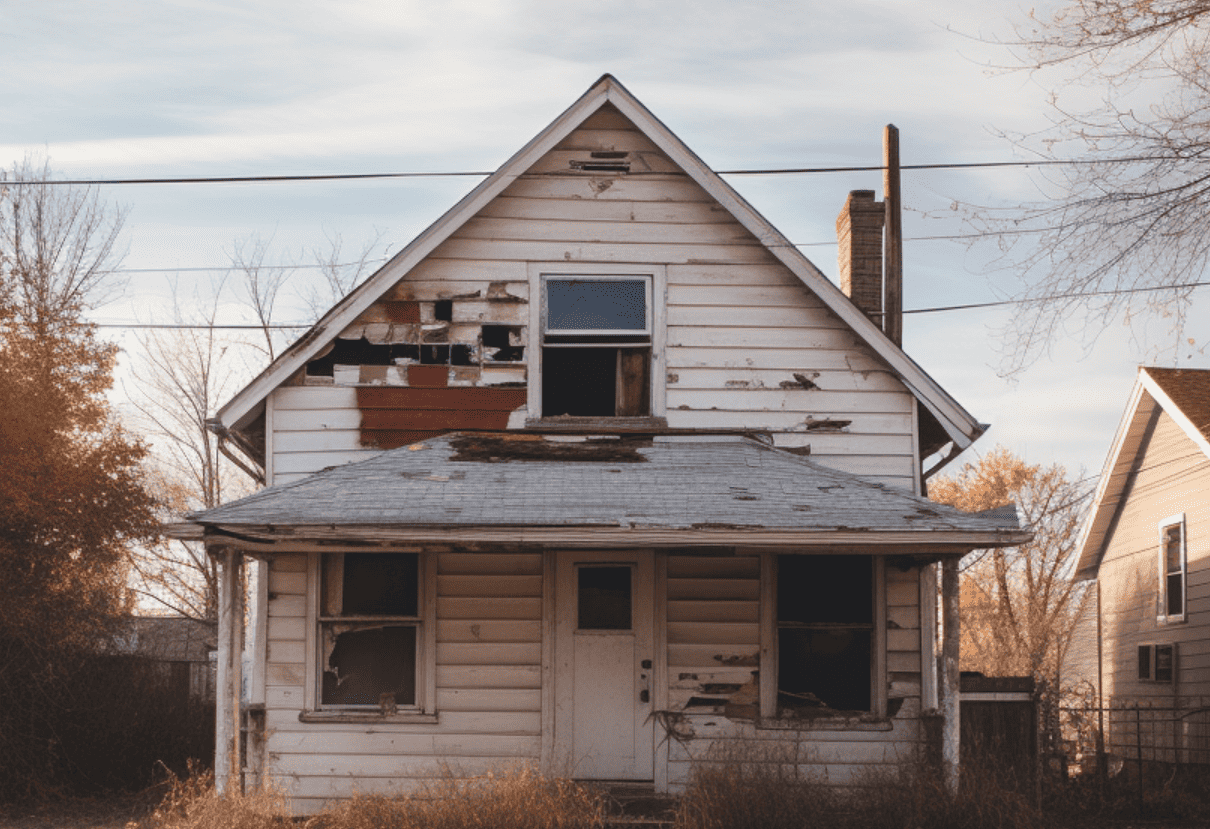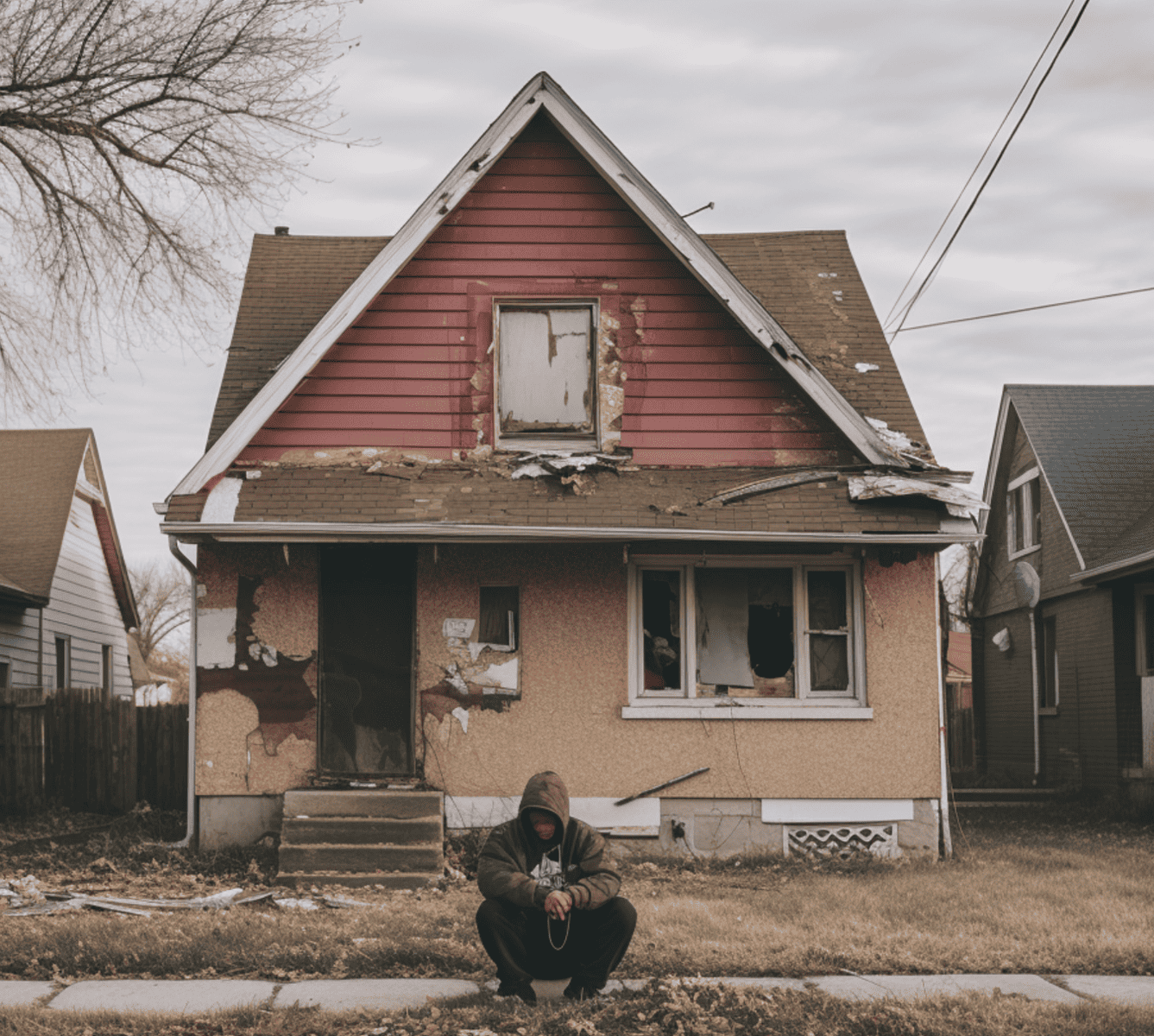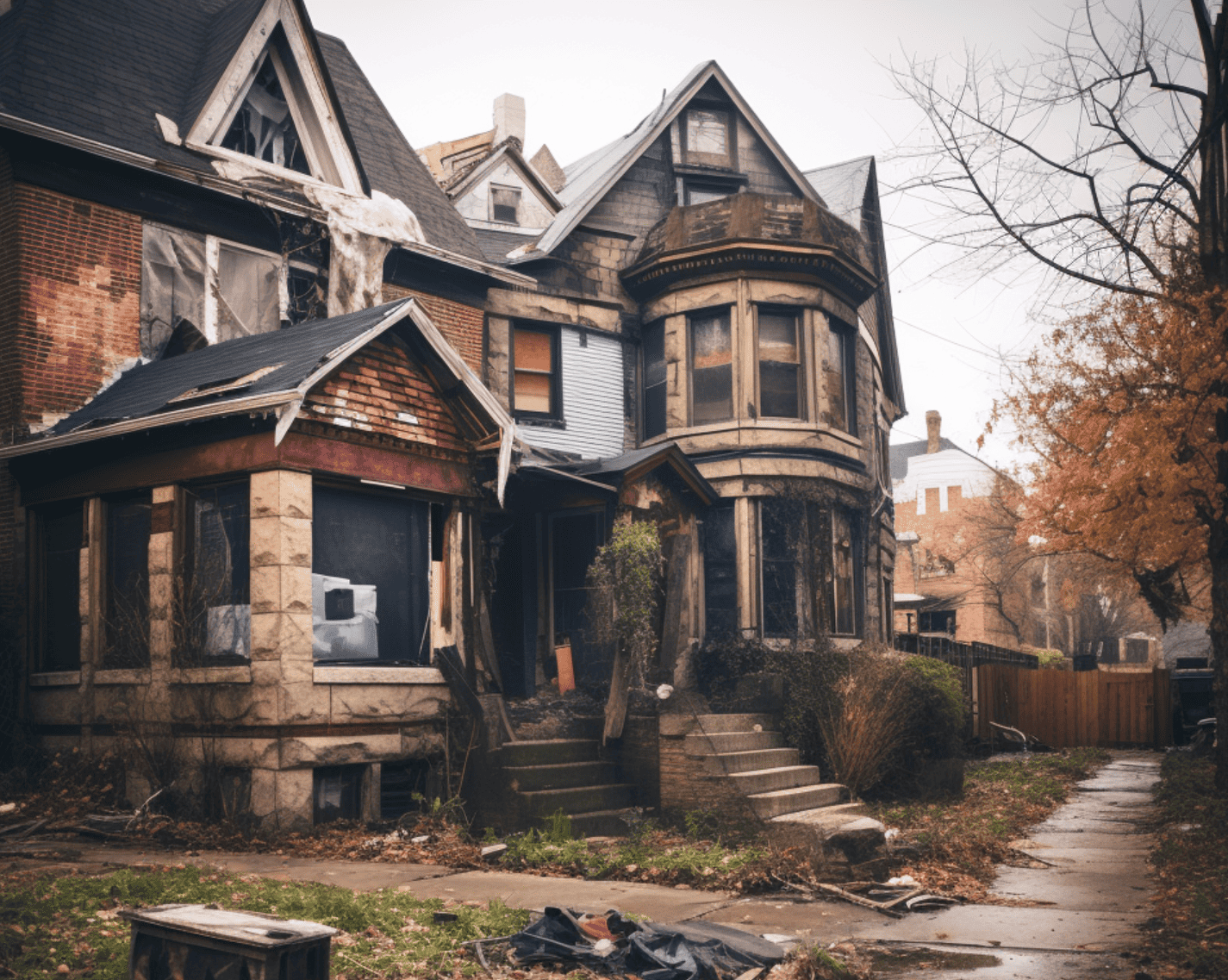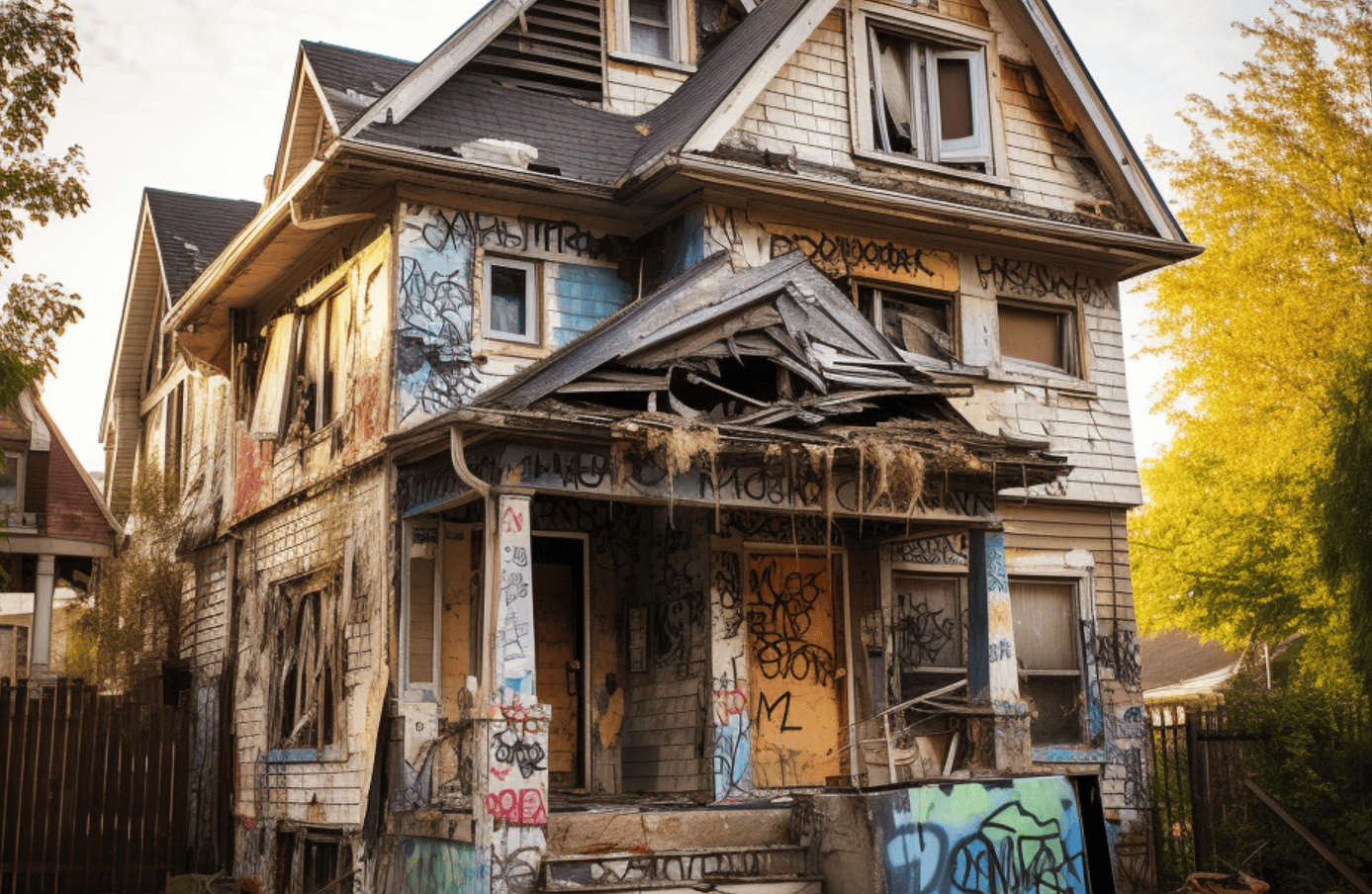Squatters rights in Chicago IL, encompass the legal rights of individuals who occupy a property without permission or ownership and may involve an adverse possession claim.
Adverse possession law allows for the acquisition of land through exclusive possession. Color of title is the document.
**Please be aware that we at I BUY IL are not attorneys. **
** This is for informational purposes only and should not be considered legal advice.**
This complex issue of adverse possession law has significant implications for property owners, realtors, and squatters alike. Understanding the basics of squatters rights in Illinois is crucial for realtors and anyone involved in property law, especially when dealing with land.
This knowledge is particularly important in the context of adverse possession claims within the city. Squatting can result in disputes over property ownership, eviction proceedings, and potential financial losses for property owners.
Additionally, squatter’s rights and adverse possession claims may arise, leading to legal battles over the premises and land. On the other hand, squatters may seek protection under certain circumstances in property law to establish occupancy rights for land and houses. Realtors can guide in these cases.

Legal Status and Definition
of Squatters
Definition of Squatters
In Illinois, squatters occupy land without the owner’s consent or legal right. Whether you’re a cash buyer or have lived on the property for years, squatters can cause significant issues.
This means that squatters live on land they do not own or have any legal claim to.
The buyer should know these squatters’ rights and consider the implications before making a cash purchase.
Adverse Possession Laws
Adverse possession, also known as squatter rights, is a legal concept allowing a person to gain ownership of someone else’s property through continuous and uninterrupted possession for a specified period.
In Illinois, the requirements for adverse possession, also known as squatters rights, include open and notorious occupation, exclusive control, continuous use for at least 20 years (15 years if the occupant has paid taxes on the property), and hostile intent (meaning without the owner’s permission).
This means that if someone occupies a property without permission for a certain period of time, they may be able to claim ownership under squatter’s rights.
However, it’s important to note that this does not apply if the owner is actively using or occupying the property.
Additionally, adverse possession does not involve monetary compensation, so squatters cannot receive cash for claiming ownership.
Factors Affecting Legal Status
The legal status of squatters in Chicago can vary depending on several factors, including cash.
The length of occupation is an essential consideration for squatter’s rights, as adverse possession requires a significant period of continuous use to claim ownership.
However, it is worth noting that squatters may not always have legal rights to the property and may be required to vacate if the rightful owner demands payment in cash.
The intent of squatters is also considered – if they entered the property to claim ownership or simply as temporary shelter without any money being involved.

Understanding Illinois Adverse Possession Laws
Adverse Possession in Illinois
Adverse possession is a legal concept that allows squatters to gain ownership of a property by occupying it openly and continuously for a specified period, known as squatter rights. In Illinois, squatter’s rights, also known as adverse possession, require occupation for at least 20 years with payment of property taxes during that time.
This means that if someone exercises squatters rights by occupying a property without permission and maintains exclusive control over it for two decades while also fulfilling their tax obligations, they may be able to claim ownership through adverse possession.
Balancing Property Rights
Adverse possession aims to strike a balance between protecting the rights of property owners and preventing abandoned properties from falling into disrepair. These laws help address the issue of squatter rights.
By allowing squatters, individuals who have taken care of neglected properties for an extended period, to gain legal ownership, these squatter laws aim to encourage the productive use of land while discouraging neglect or abandonment.
Adverse possession can be seen as a way to incentivize responsible stewardship of properties, even when dealing with squatters. It allows squatters who have invested time and resources into maintaining abandoned or unused properties to acquire legal rights over them.
However, it is important to note that squatters should not use adverse possession to take someone else’s property unlawfully.
Potential claimants, property owners, and squatters must understand the requirements outlined in Illinois’ laws of adverse possession.
This knowledge can help prevent disputes between property owners and squatters and ensure fair outcomes.

Requirements for Establishing
Squatters’ Rights in Illinois
Continuous and Exclusive Occupation
The occupant must meet specific requirements to establish squatters’ rights in Illinois. One of these requirements is continuous and exclusive occupation of the property for at least 20 years.
This means the occupant must have physically resided on the property without interruption for two decades. It is crucial to note that occasional or sporadic use of the property does not fulfill this requirement.
Open and Notorious Use
Another requirement for establishing squatters’ rights in Illinois is demonstrating open and notorious use of the property. This means the occupant’s occupation must be visible and apparent to others.
It should be clear to anyone observing that someone is living on or using the property without permission from the owner. This can include actions such as maintaining a residence, making improvements, or even openly occupying a structure on the property.
Payment of Property Taxes
In many cases, payment of property taxes during the occupation period is necessary to claim adverse possession or squatters’ rights in Illinois.
Paying taxes on the property demonstrates an intention to take ownership and responsibility for its upkeep.
However, consulting with legal professionals regarding specific tax requirements and implications is important.
Meeting these requirements can be challenging but essential for establishing squatters’ rights in Illinois. Understanding that each case may vary depending on individual circumstances and local laws is vital.
Seeking legal advice from an experienced attorney specializing in real estate law can guide this process.
Remember that adverse possession differs from state to state, so it’s crucial to familiarize yourself with your state’s specific regulations before attempting to claim squatters’ rights.
The Process of Evicting Squatters in Chicago
Eviction Notice and Lawsuit
Evicting squatters in Chicago requires following a legal process that begins with serving an eviction notice. If the squatter refuses to leave voluntarily, the property owner may need to file a lawsuit and obtain a court order for eviction.
This step is crucial as it ensures the property owner has the legal authority to remove the squatter from their premises.
Working with an Attorney
Navigating the eviction process can be complex, so property owners should work with an experienced attorney.
An attorney specializing in real estate law can guide property owners through each process step, ensuring that all necessary paperwork is filed correctly and deadlines are met.
They can also provide valuable advice on handling potential complications or disputes that may arise during eviction.

Strategies to Prevent Squatters from Claiming Your Chicago Property
Securing Vacant Properties
Taking proactive measures to prevent squatters from claiming your property in Chicago is essential.
One effective strategy is to secure vacant properties with sturdy locks and alarm systems. By installing reliable locks on doors and windows, you can make it difficult for unauthorized individuals to gain access.
An alarm system can act as a deterrent, alerting authorities and neighbors if someone tries to enter the property without permission.
Regular Inspections and Maintenance
Regularly inspecting and maintaining vacant properties can also help deter squatters.
When a property appears neglected or abandoned, it becomes more appealing to those seeking a place to squat.
You can demonstrate that the property is monitored and cared for by conducting routine inspections and promptly addressing maintenance issues. This sends a clear message that trespassers are not welcome.
Establishing Clear Boundaries
Establishing clear boundaries is another effective way to discourage potential squatters. Mark the boundaries of your property using fences or other physical barriers. Prominently display “no trespassing” signs throughout the premises.
These signs serve as a legal notice that entering the property without permission is prohibited.
By making it evident that your property is private and off-limits, you reduce the likelihood of squatters attempting to claim it.
These preventative measures can significantly reduce the risk of squatters claiming your Chicago property.

Critical Considerations for Landlords and Property Owners
Familiarize Yourself with Local Laws
To protect their interests, landlords and property owners in Chicago, IL, should familiarize themselves with local laws regarding squatters’ rights.
These laws outline the rights of individuals who occupy a property without legal ownership or permission.
By understanding these laws, landlords can take appropriate action to prevent squatting and handle any situations that may arise.
Conduct Thorough Background Checks
One effective strategy for preventing squatting is to conduct thorough background checks on prospective tenants.
This process can help identify any previous history of squatting or adverse possession claims. By obtaining references from previous landlords and conducting criminal background checks, landlords can gain valuable insights into a tenant’s rental history and potential risk factors.
Maintain Open Communication
Maintaining open lines of communication with tenants is crucial in preventing situations that could lead to squatting. Regularly checking in with tenants and promptly addressing any issues or concerns can help foster a positive landlord-tenant relationship.
When tenants feel heard and supported, they are less likely to engage in illegal activities like squatting.
Secure Vacant Properties
Owners of vacant properties should take extra precautions to secure their premises. Installing security systems, reinforcing doors and windows, and regularly inspecting the property can deter potential squatters from entering.
Hiring property management services or caretakers to monitor the property can provide an added layer of protection.
Seek Legal Advice
When faced with potential squatting issues or disputes, landlords and property owners should seek legal advice from professionals experienced in real estate law.
These experts can guide the best decision based on individual circumstances, ensuring landlords protect their rights while adhering to applicable laws.
Exploring Illinois Laws Regarding Squatting and Adverse Possession
Illinois has specific laws governing squatting and adverse possession, which vary from other states.
Illinois has its own set of laws that specifically address the issues of squatting and adverse possession. These laws may differ from those in other states, so it is essential for property owners, landlords, and real estate professionals operating in Illinois to have a clear understanding of them.
Understanding these laws is crucial for Illinois property owners, landlords, and real estate professionals.
For property owners in Illinois, it is vital to understand the state’s laws regarding squatting and adverse possession. Squatting occurs when an individual occupies a property without permission or legal rights.
Adverse possession refers to the acquisition of ownership rights over another person’s property through continuous occupation for a certain period of time.
By familiarizing themselves with these laws, property owners can protect their rights and take appropriate action if they encounter squatters or face an adverse possession claim.
This knowledge also enables landlords to manage their properties effectively and ensure tenants are lawfully occupying them.
Consulting with a knowledgeable attorney specializing in real estate law can provide valuable insights into the intricacies of Illinois laws related to squatting.
Given the complexities of squatting and adverse possession cases, consulting with a skilled attorney specializing in real estate law is highly recommended.
An experienced attorney can provide valuable insights into the intricacies of Illinois laws related to squatting, including the requirements for establishing an adverse possession claim or evicting squatters.
An attorney will be able to guide property owners through the legal process, help them understand their rights and responsibilities under Illinois law, and assist them in taking appropriate legal action when necessary.
With their expertise, attorneys can offer personalized advice tailored to each unique situation.
Conclusion
In conclusion, understanding the legal landscape surrounding squatters’ rights in Chicago, Illinois, is essential for property owners and landlords.
This article has explored the legal status and definition of squatters, the requirements for establishing squatters’ rights, the process of evicting squatters in Chicago, and strategies to prevent them from claiming your property.
It has also delved into key considerations for landlords and property owners and the broader exploration of Illinois laws regarding squatting and adverse possession.
By familiarizing oneself with these topics, property owners can better protect their rights and avoid potential disputes with squatters.
It is crucial to consult with legal professionals specializing in real estate law to navigate these complex issues effectively. Staying informed about any changes or updates to relevant laws is advisable.
Remember, being proactive and taking preventive measures can help mitigate the risk of squatters asserting adverse possession claims.
Enter your home address
Do You Own A Vacant Lot Of Land In Chicago?
What Questions Do We Get Asked A Lot?
Do You Own An MDU? A Multi-Dwelling Unit?



